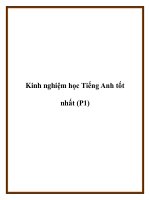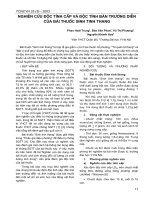Bài 08 - Sinh nhật, Tuổi pot
Bạn đang xem bản rút gọn của tài liệu. Xem và tải ngay bản đầy đủ của tài liệu tại đây (125.31 KB, 17 trang )
Bài 08 - Sinh nhật, Tuổi
Conversation 1 : When is your birthday?
-
Xiānsheng,
先生
nín
您
shì
是
nǎ
哪
nián
年
chūshēng
出生
de?
出生 chūshēng
(v) birth
的 de (part)
a modal particle
生日 shēngrì (n) birthday
的?
-
Wǒ
我
shì
是
1976
1976
nián
年
chūshēng
出生
de.
的。
-
Nín
您
de
的
shēngrì
生日
shì
是
j
ǐ yuè
几月
j
ǐ hào ?
几号?
-
Wǒ
我
de
的
shēngrì
生日
shì
是
3 yuè
3月
5 hào.
5号。
Translation
- Mister, in which year were you born?
- I was born in 1976.
- When is your birthday? ( Your birthday is what month what day? )
- The 5th of march.( My birthday is March, 5th )
Conversation 2 : How old are you?
-
N
ǐ
你
jīnni
án
今年
duō
多
dà ?
大?
-
Wǒ
我
jīnni
án
今年
30 suì.
30岁。
多 duō (n) how much, how many
多大 duōdà (n) how old
岁 suì (n) year (of age)
Translation
- How old are you? ( this year )
- I'm 30.
Conversation 3 : When will you be in Beijing?
-
Nín
您
shì
是
shénme
什么
shíhou
时候
dào
到
Běijīng
北京
时候 shíhou (n) time, moment
什么时候
shénmeshíhou
(n) when
到 dào (v) arrive, up to
天 tiān (n) day
de?
的
-
Wǒ
我
shì
是
8 yuè
8月
7 hào
7号
dào
到
Běijīng
北京
de.
的。
-
Nín
您
xiǎng
想
nǎ
哪
tiān
天
qù
去
Shànghǎi ?
上海?
-
Wǒ
我
xiǎng
想
xià
下
xīngqīwǔ
星期五
qù
去
Shànghǎi.
上海。
Translation
- When will you be in Beijing?
- I will be in Beijing on July 8th.
- When ( what day ) do you want to go to Shanghai?
- I want to go to Shanghai next friday.
Conversation 4 : When will you go back?
-
N
ǐ
你
dǎsuàn
打算
shénmeshíhou
什么时候
huí
回
guó ?
国?
-
Wǒ
我
打算 dǎsuàn (v) plan, intend
回 huí (v) return
国 guó (n) country
还 hái (adv)
also, too
来 lái (v) come
dǎsuàn
打算
míngnián
明年
9 yuè
9月
huí
回
guó.
国。
Hòunián
后年
wǒ
我
hái
还
dǎsuàn
打算
lái
来
Zhōngguó.
中国。
Translation
- When will you bo back? ( when dou you plan to go back to your country )
- September of next year. ( I plan to go back September of next year )
I plan to come back in China in two years. ( In two years, I plan to return to China)
Grammar
Phrase structure : 是 的
是 的 is used in a sentence to emphasize the time, place or manner of an action
which took place in the past. 是 is placed before the word group that is
emphasized (是 may sometimes be omitted) and 的 comes after the verb or at the
end of the sentence.
Example:
- 你 是 哪年 出生 的? Which year are you born?
- 我 是 1976年 出生 的。 I'm born in 1976?
- 你 是 什么时候 到 北京 的? When did you arrive in Beijing?
- 我 是 昨天 到北 京 的。 I arrived in Beijing yesterday?
Time, adverb position
When an adverbial adjunct denotes the time of an action, it can be put before the
subject or verb.
Example:
- 我 想 明天 去 上海。I'll go to Shanghai tomorrow.
- 我 打算 明天 回国。 I'll go back tomorrow.
- 明年 我 打算 还 来 中国。 I plan to be back in China next year.
Exercises : Substitution Drills
Exercise 1
-
Nín
您
shì
Sub. 1
Sub. 2
他,她 tā he, she 1980 年
是
nǎ
哪
nián
年
chūshéng
出生
de?
的
-
Wǒ
我
shì
是
1978 nián
1978 年
你 nǐ you 1973 年
你的朋友
nǐdepéngyou
your friend 1968 年
她的姐姐
tādejiějiě her elder sister
1953 年
我的老师
wǒdelǎoshī my teacher 1947 年
chūshēng
出生
de.
的
Exercise 2
-
Nín
您
jīngni
án
今年
duōdà ?
多大
-
Wǒ
我
jīnni
án
Sub. 1
Sub. 2
你 nǐ you 19 岁
你的同学
nǐdetóngxué
your classmate 26 岁
他的妈妈
tādemāma his mum 35 岁
她的同事
tādetóngshì
her workmate 39 岁
张老师 Zhānglǎoshī
Professor Zhang
50 岁
今年
30 suì.
30岁
Exercise 3
-
N
ǐ
你
shì
是
shénmeshíhou
什么时候
dào
到
Běijīng
北京
de?
的
Sub. 1
1月6号 1yuè8hào January 6th
昨天 zuótiān yesterday
上个星期四
shànggèxīngqīsì
last thursday
上个月 shànggèyuè last month
前天 qiántiān the day before yesterday
Sub. 2
上海 Shànghǎi
-
wǒ
我
shì
是
8yuè7hào
8月7号
dào
到
Běijīng
北京
de.
的
大连 Dàlián
广州 Guǎngzhōu Canton
天津 Tiānjīn
西安 Xī'ān









